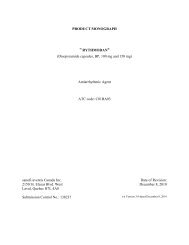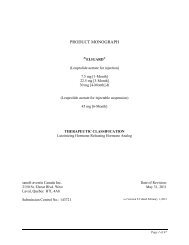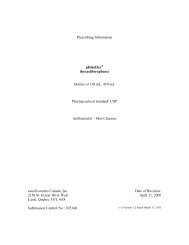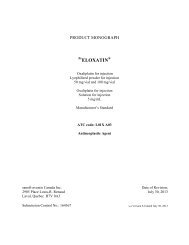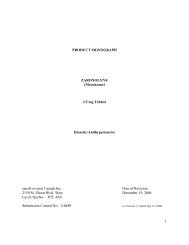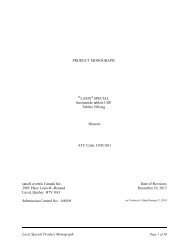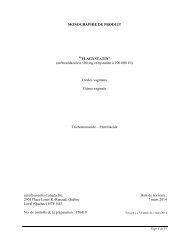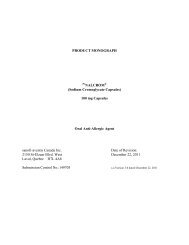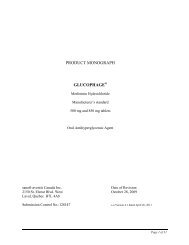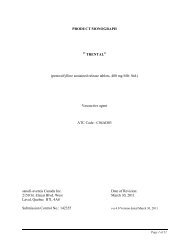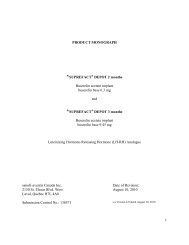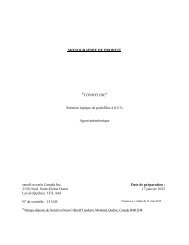Apidra (insulin glulisine) - Sanofi Canada
Apidra (insulin glulisine) - Sanofi Canada
Apidra (insulin glulisine) - Sanofi Canada
Create successful ePaper yourself
Turn your PDF publications into a flip-book with our unique Google optimized e-Paper software.
example, in patients whose sugar levels are markedly<br />
improved, in elderly patients, in patients with diabetic<br />
nerve disease, in patients with a long history of<br />
diabetes, or in patients receiving concurrent treatment<br />
with certain other drugs. Such situations may result in<br />
severe hypoglycemia (and possibly, loss of<br />
consciousness) before a patient has symptoms.<br />
Some people may not recognize when their blood<br />
sugar drops low. Without recognition of early warning<br />
symptoms, you may not be able to take steps to avoid<br />
more serious hypoglycemia. Be alert for all of the<br />
various types of symptoms that may indicate<br />
hypoglycemia. Patients who experience hypoglycemia<br />
without early warning symptoms should monitor their<br />
blood glucose frequently, especially prior to activities<br />
such as driving a car or use mechanical equipment. If<br />
the blood glucose is below your normal fasting<br />
glucose, you should consider eating or drinking sugarcontaining<br />
foods to treat your hypoglycemia.<br />
If you have frequent episodes of hypoglycemia or<br />
experience difficulty in recognizing the symptoms, you<br />
should consult your health professional to discuss<br />
possible changes in therapy, meal plans, and/or<br />
exercise programs to help you avoid hypoglycemia.<br />
Hyperglycemia<br />
Hyperglycemia (too much glucose in the blood) may<br />
develop if your body has too little <strong>insulin</strong>.<br />
Hyperglycemia can be brought about by:<br />
• intercurrent conditions (illness, stress, or<br />
emotional disturbances),<br />
• not taking your <strong>insulin</strong> or taking less than<br />
recommended by your health professional,<br />
• malfunction and/or misuse of medical<br />
devices,<br />
• eating significantly more than your meal plan<br />
suggests,<br />
• a new <strong>insulin</strong> type or schedule,<br />
• some new medications, including<br />
prescriptions, over-the counter medications,<br />
herbs, vitamins and street drugs.<br />
Symptoms of hyperglycemia include:<br />
• confusion or drowsiness,<br />
• increased thirst,<br />
• decreased appetite, nausea, or vomiting,<br />
• rapid heart rate,<br />
• increased urination and dehydration (too little<br />
fluid in your body),<br />
• blurred vision,<br />
• flushed dry skin,<br />
• acetone odour of breath.<br />
IMPORTANT: PLEASE READ<br />
Hyperglycemia can be mild or severe. It can progress<br />
to high glucose levels, diabetic ketoacidosis (DKA),<br />
and result in unconsciousness and death.<br />
Diabetic ketoacidosis (DKA)<br />
The first symptoms of diabetic ketoacidosis usually<br />
come on over a period of hours or days. With<br />
ketoacidosis, urine tests show large amounts of glucose<br />
and acetone.<br />
Symptoms of diabetic ketoacidosis include:<br />
First symptoms:<br />
• drowsiness,<br />
• flushed face,<br />
• thirst,<br />
• loss of appetite,<br />
• fruity smelling breath,<br />
• rapid, deep breathing,<br />
• abdominal (stomach area) pain.<br />
Severe symptoms:<br />
• heavy breathing,<br />
• rapid pulse.<br />
Prolonged hyperglycemia or diabetic ketoacidosis can<br />
lead to:<br />
• nausea,<br />
• vomiting,<br />
• dehydration,<br />
• loss of consciousness,<br />
• death.<br />
Severe or continuing hyperglycemia or DKA<br />
requires prompt evaluation and treatment by your<br />
health professional.<br />
Allergic reactions<br />
In rare cases, a patient may be allergic to an <strong>insulin</strong><br />
product. Severe <strong>insulin</strong> allergies may be lifethreatening.<br />
If you think you are having an allergic<br />
reaction, seek medical help immediately.<br />
Signs of <strong>insulin</strong> allergy include:<br />
• a rash all over your body,<br />
• shortness of breath,<br />
• wheezing (trouble breathing),<br />
• a fast pulse,<br />
• sweating,<br />
• low blood pressure.<br />
Possible reactions on the skin at the injection site<br />
Injecting <strong>insulin</strong> can cause the following reactions on<br />
the skin at the injection site:<br />
• a little depression in the skin (lipoatrophy),<br />
• skin thickening (lipohypertrophy),<br />
Page 60 of 61



